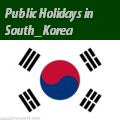
|
South Korean HolidaysVarious public & national holidays observed in South Korea |
- sitesworld.comNational Celebration Day (Hangul: 국경일, Hanja: 國慶日)
- National Flag Raising Day (Hangul: 국기게양일, Hanja: 國旗揭揚日)
- Public Day Off (Hangul: 공휴일, Hanja: 公休日)
| sitesworld.comDate | Name | ||
|---|---|---|---|
| English name | Korean name | Korean name | |
| January 1 | New Year's Day | 쉠ꠕ | Sinjeong |
| February 10 | Korean New Year's Day | 설뀠 | Seollal |
| March 1 | Independence Movement day | 삼일ꠈ | Samiljeol |
| May 5 | Children's Day | 어린이뀠 | Eorininal |
| May 17 | Buddha's Birthday | 석가탄쉠일 | Seokgatansinil |
| June 6 | Memorial Day | 현충일 | Hyeonchung-il |
| August 15 | Liberation Day | 광복ꠈ | Gwangbokjeol |
| September 19 | Midautumn Festival | 추석 | Chuseok |
| October 3 | National Foundation Day | 개천ꠈ | Gaecheonjeol |
| October 9 | Hangul Day | 한글뀠 | Hangeulnal |
| December 25 | Christmas Day | 성탄ꠈ | Seongtanjeolsitesworld.com |
| sitesworld.comName | Date | Remarks | National Celebration Day | Flag Raising | Day Off |
|---|---|---|---|---|---|
| New Year's Day 쉠ꠕ(新正)1 | January 1 | The day celebrates new year. | No | (#) | Yes |
| Korean New Year's Day 설뀠 | 1st day of 1st lunar month | Also called " Seol (설)" or " Gujeong (구ꠕ, 舊正)". The first day of the lunar Korean calendar. It is one of the most important of the traditional Korean holidays, and is considered a more important holiday than the solar New Year's Day. | No | No | Yes (3 days) |
| Independence (Declaration) Day 3.1ꠈ(三一節) | March 1 | This day commemorates the March 1st Movement in 1919. On March 1 of this year, 33 Korean nationalist students declared their nation's independence in Seoul. It started a nation-wide civil protest and was a catalyst for the establishment of the Provisional Government of the Republic of Korea (April 13, 1919). | Yes | (#) | Yes |
| Children's Day 어린이뀠 | May 5 | The day on which to esteem the personalities of children and plan for their happiness. In Korea, Children's Day started on May 1, 1922, when 8 persons including Bang Jeong-Hwan (in Korean 방ꠕ환) declared the Day and held an anniversary. In 1946, the Day changed to May 5, and became a public holiday in 1975. | No | No | Yes |
| Buddha's Birthday 석가탄쉠일(釋迦誕辰日) | 8th day of 4th lunar month | Also called " Bucheonnim Osinnal (부처님 오쉠 뀠)" or " Sawol Chopail (사월 초파일,四月初八日). The birthday of the Gautama Buddha. In South Korea, Buddhism is the one of two major religions, along with Christianity. | No | No | Yes |
| Memorial Day 현충일(顯彠日) | June 6 | The day commemorates the men and women who died while in military service or in the independence movement. On this day, a national commemoration ceremony is held in Seoul National Cemetery. | No | (#) (half mast) | Yes |
| Constitution Day ꠜ헌ꠈ(制憲節) | July 17 | The day celebrates the promulgation of the Constitution of the Republic of Korea in 1948. | Yes | (#) | No |
| Liberation Day 광복ꠈ(光復節) | August 15 | The day celebrates the national liberation from Imperial Japan in 1945. On the same day in 1948, the government of the Republic of Korea was established. The word " Gwangbok " means "restoration of light". | Yes | (#) | Yes |
| Midautumn Festival 추석(秋夕) | 15th day of 8th lunar month | Also called " Han-gawi (한가위)". Korean traditional Harvest Festival. With Seollal , it is one of the most important Korean traditional holidays. As a celebration of the good harvest, Koreans visit their ancestral hometowns and share a feast of Korean traditional food. | No | No | Yes (3days) |
| Armed Forces Day 국군(國軍)의 뀠 | October 1 | The day recognizes, venerates, and honors the military forces of the Republic of Korea. In 1950, during the Korean War, South Korean Forces broke through the 38th parallel on October 1. | No | (#) | No |
| National Foundation Day 개천ꠈ(開天節) | October 3 | The day celebrates the foundation of Gojoseon, the first state of the Korean nation. According to the Samguk Yusa, Dangun founded Gojoseon on the 3rd day of 10th lunar month, 2333 BC. Today, South Koreans celebrate their national foundation on October 3 according to the solar calendar, for convenience sake. " Gaecheonjeol " means "Heaven-opened Day". | Yes | (#) | Yes |
| Hangul Day 한글뀠 | October 9 | The day commemorates the invention (1443) and the proclamation (1446) of hangul, the native alphabet of the Korean language.King Sejong the Great, inventor of hangul, is one of the most honored rulers in Korean history. | Yes | (#) | Yes |
| Christmas Day 기독탄쉠일(基督誕辰日) | December 25 | Christmas is commonly called " Seongtanjeol (성탄ꠈ,聖誕節)" in Korean(especially among Korean Catholics), but the official Korean name fixed by law is " Gidoktansinil "2. In South Korea, Korean Christianity is the one of two major religions, along with Buddhism. | No | No | Yes |
| Footnotes : 1 This is not a legal name. The legal name is simply "January 1" | |||||